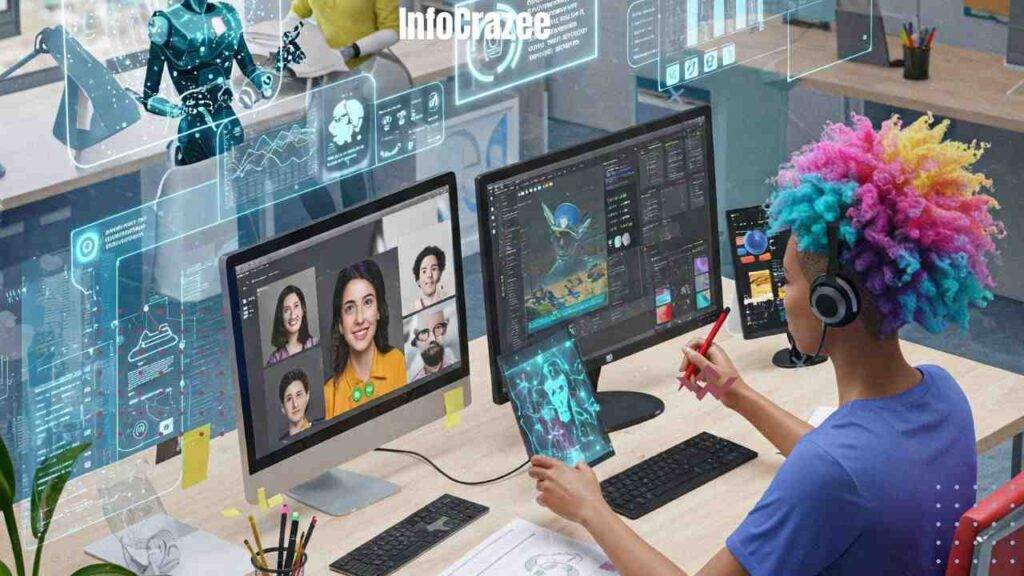The Future of Work: How Technology is Shaping Our Careers and Daily Lives
We’re living through a time when technology is changing everything—from how we work to how we live. Whether it’s working from home, using AI to boost productivity, or automating mundane tasks, the future of work is exciting, and it’s already here. Let’s take a look at how technology is reshaping careers and our everyday lives.
The Rise of Remote Work
Not too long ago, the idea of working from home was a luxury or a rarity. Today, it’s becoming the norm for millions of people across the world. Thanks to tools like Zoom, Slack, and Google Docs, remote work has never been easier.
- Flexibility: People can now work from anywhere, whether it’s from a cozy home office or a coffee shop across the world.
- Work-life balance: Remote work gives many people the chance to better balance their professional and personal lives. No more long commutes or juggling between the office and home responsibilities.
- Global talent pool: Employers can now hire the best talent from anywhere, which means there’s less competition for jobs and more opportunities for workers around the globe.
Real-world Example:
Take Sarah, a freelance graphic designer. She works with clients from different time zones and uses video calls to communicate, while sharing files on the cloud. Remote work tools let her do it all from her living room—giving her the flexibility she needs to take care of her family while still pursuing her career.
AI and Automation: Changing the Way We Work
AI isn’t just for sci-fi movies—it’s already changing how we do our jobs. Whether it’s automating repetitive tasks or helping with decision-making, AI is transforming every industry.

- Automation of repetitive tasks: Things like scheduling meetings, answering customer queries, or organizing data are now handled by smart bots and AI-powered tools.
- Better decision-making: AI helps us analyze data faster and more accurately than ever. It can predict trends, help with marketing decisions, and even spot problems before they happen.
- Creative assistance: AI isn’t just for admin work. Tools like AI-driven design programs or music composition apps are helping artists and creators push boundaries and be more efficient.
Real-world Example:
Imagine a marketing team using AI to run data-driven campaigns. The AI analyzes customer behavior, predicts future trends, and automatically adjusts the campaigns in real-time, saving hours of manual work and boosting results.
The Gig Economy and Freelancing: More Independence, More Opportunities
The gig economy has been around for a while, but with tech advancements, it’s more accessible than ever. Freelancers can now easily connect with clients through platforms like Upwork, Fiverr, and Freelancer, giving them more control over their careers.

- More freedom: Freelancers can choose which projects to take on, when and where to work, and how much to charge.
- More opportunities: Technology has created more freelance jobs in fields like writing, web development, graphic design, and even video editing.
- Global clients: The internet allows freelancers to find work with clients from anywhere in the world, giving them access to a much larger job market.
Real-world Example:
Meet John, a software developer. He left his full-time job to become a freelancer and now works with clients in Europe, Asia, and North America. Thanks to online platforms, he’s been able to set his own schedule, pick the projects that excite him, and grow his business without stepping foot into an office.
How Technology is Making Workplaces More Efficient
Not just remote workers are benefiting from technology—office workers are also seeing huge improvements in how they collaborate and stay productive. Tools like cloud storage, virtual assistants, and project management apps have transformed the way teams work together.

- Cloud collaboration: With tools like Google Drive and Microsoft 365, teams can collaborate on documents in real time, no matter where they are.
- Virtual assistants: AI assistants like Siri, Alexa, or Google Assistant can help schedule meetings, send reminders, and perform tasks that would take up valuable time.
- Task automation: Businesses are using technology to automate simple tasks like billing, inventory management, and payroll, freeing up time for more complex work.
Real-world Example:
A marketing team uses Trello for project management and Slack for communication. They share ideas, track tasks, and collaborate on designs all in one platform, making the workflow smoother and more efficient. Plus, they use automation tools to handle emails and follow-ups, saving hours each week.
The Future of Jobs: What Skills Will You Need?
With all these changes happening, what does the future of work look like for you? As technology advances, the demand for new skills will increase. Here are some key skills to focus on:
- Tech-savviness: Whether it’s learning how to use new software or understanding the basics of AI and automation, being comfortable with technology will give you a major advantage.
- Adaptability: The world of work is constantly evolving. Being able to learn new skills, adjust to new tools, and work in new ways will help you stay relevant.
- Creativity and problem-solving: While machines can automate tasks, creativity and critical thinking are still human strengths that AI can’t replace.
Real-world Example:
Maria, a marketing professional, took a course on data analytics to stay ahead in her career. Now, she’s not just running ads—she’s analyzing data to help her team make better decisions and optimize campaigns. Her ability to adapt and learn new skills has opened up more career opportunities.
FAQs about The Future of Work
1. Will robots take over all jobs?
While robots and AI are automating some tasks, they can’t replace everything. Jobs that require creativity, human interaction, and critical thinking will still be in demand. The key is adapting and learning new skills.
2. How do I prepare for the future of work?
Start by learning about new technologies in your field, whether it’s AI, data analytics, or cloud computing. Focus on developing skills that machines can’t easily replicate, like problem-solving and creativity.
3. Is remote work here to stay?
Yes! Remote work is expected to continue growing, especially as companies see the benefits of a flexible workforce. It’s a great opportunity to achieve a better work-life balance and explore job opportunities from around the world.
Wrapping Up
The future of work is an exciting place, full of new opportunities and challenges. Technology is helping us work smarter, not harder, and allowing us to be more flexible and creative than ever before. Whether you’re working from home, freelancing, or in an office, embracing technology will help you stay ahead and succeed in the evolving workplace.






